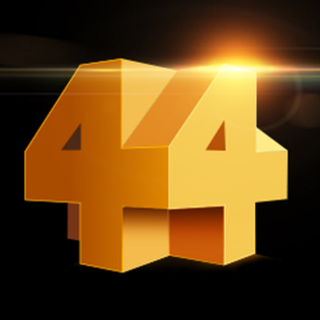
Four Corners is an Australian investigative journalism/current affairs documentary television program, the longest of its kind nationally. Broadcast on ABC in HDTV, it premiered on 19 August 1961 and celebrated its 50th anniversary in 2011. Founding producer Robert Raymond (1961–62) and his successor Allan Ashbolt (1963) did much to set the ongoing tone of the program. The program is one of only five in Australia inducted into the Logie Hall of Fame.

The Liberal–National Coalition, commonly known simply as the Coalition, is an alliance of centre-right political parties that forms one of the two major groupings in Australian federal politics. The two partners in the Coalition are the Liberal Party of Australia and the National Party of Australia. Its main opponent is the Australian Labor Party (ALP); the two forces are often regarded as operating in a two-party system. The Coalition has been in government since the 2013 federal election, most recently being re-elected in the 2019 Australian federal election. The group is led by Scott Morrison as Prime Minister of Australia since August 2018.
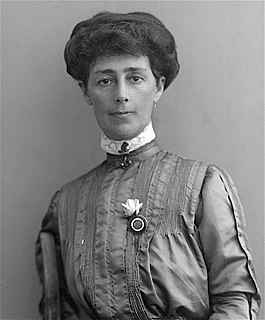
Vida Jane Mary Goldstein was an Australian suffragette and social reformer. She was one of four female candidates at the 1903 federal election, the first at which women were eligible to stand.

Adela Constantia Mary Pankhurst Walsh was a British-Australian suffragette, political organiser, and co-founder of both the Communist Party of Australia and the Australia First Movement.

Shoalwater Bay is a large bay on the Capricorn Coast of Central Queensland, Australia 100 km north of the coastal town of Yeppoon and 628 km north-north-west of the state capital, Brisbane. Since 1966, the land surrounding Shoalwater Bay has been under the ownership of the Australian Defence Force, for the purpose of military training exercises. Shoalwater Bay is also a noted dugong habitat and is part of the Great Barrier Reef Marine Park. The bay is bounded by the Torilla Peninsula to the west and the Warginburra Peninsula and Leicester and Townshend islands to the east.
The following lists events that happened during 1903 in Australia.

Major General Harold Edward "Pompey" Elliott, was a senior officer in the Australian Army during the First World War. After the war he served as a Senator for Victoria in the Australian parliament.
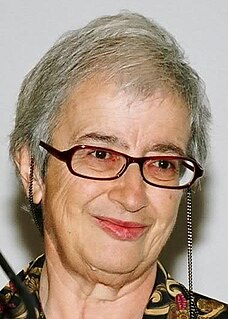
Eva Maria Cox is an Austrian-born Australian writer, feminist, sociologist, social commentator and activist. She has been an active advocate for creating a "more civil" society. She was a long-term member of the Women's Electoral Lobby (WEL), and is still pursuing feminist change by putting revaluing social contributions and wellbeing onto political agendas, as well as recognising the common ground between Australia's First Nations and feminist values of the importance of the social.
Stephen Hagan is an Australian author and anti-racism campaigner. He is also a newspaper editor, documentary maker, university lecturer and former diplomat.
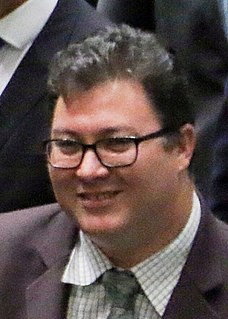
George Robert Christensen is an Australian politician who has been a member of the House of Representatives since the 2010 federal election, representing the Division of Dawson. He is a member of the Liberal National Party of Queensland, and sits with the National Party in federal parliament. He is known for his social conservatism and for his criticism of Islam.

Women's suffrage in Australia was one of the earliest objectives of the movement for gender equality in Australia. It began to be socially and politically accepted and legislated during the late 19th century, beginning with South Australia in 1894 and Western Australia in 1899. In 1902, the newly established Australian Parliament passed the Commonwealth Franchise Act 1902, which set a uniform law enabling women to vote at federal elections and to stand for the federal Parliament. This removed gender discrimination in relation to electoral rights for federal elections in Australia. By 1911, the remaining Australian states had legislated for women's suffrage for state elections. It took longer before women could stand for parliament throughout Australia and even longer before they were actually elected.
Eva Bacon, born Eva Goldner, was a socialist and feminist based in Brisbane, Australia, who was most active between the 1950s and the 1980s. Raised in Austria and a member of several leftist political organisations in her youth, Eva Goldner escaped Nazi occupied Austria in 1939, eventually migrating to Australia. Goldner remained involved in local and international politics and joined the Communist Party of Australia (CPA), marrying fellow member Ted Bacon in 1944. Throughout her career Bacon was an active member of the CPA, and the Union of Australian Women (UAW), where she was heavily involved in International Women's Day campaigns, including attending the 1975 UN World Conference on Women in Mexico celebrating International Women's Year. Bacon was also an active member of the Women's Electoral Lobby (WEL), the Women's International League for Peace and Freedom (WILPF). She was passionate about childcare issues, and through her political work clashed particularly with conservative Queensland Premier Joh Bjelke-Peterson.
Tom Barker was a New Zealand tram conductor, trade unionist and socialist. He was born in Crosthwaite, Westmorland, England. He was a leading member of the Industrial Workers of the World (IWW) and politician in New Zealand and Australia.
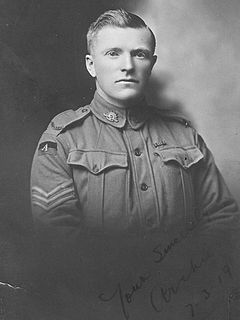
↵
ANZAC Girls is an Australian television drama series that first screened on ABC1 on 10 August 2014. The six-part series tells the rarely told true stories of the nurses serving with the Australian Army Nursing Service at Gallipoli and the Western Front during the First World War. The series is based on Peter Rees' book The Other ANZACs as well as diaries, letters, photographs and historical documents. The series was written by Felicity Packard and Niki Aken, produced by Screentime, and filmed in South Australia.
Agnes Eva Hughes, was a political activist in Victoria, Australia. She was one of the founders and presidents of the Australian Women's National League, and campaigned for conscription in the First World War.
Catherine (Kit) McNaughton (c.1887-1953) was an Australian nurse who served in World War I. She kept a detailed diary of her experiences.
Margaret Sturge Thorp, also known as "The Peace Angel", was a peace activist and labour activist active in Australia in the 20th century. A Quaker, her religious beliefs guided her to a life of advocating for a variety of pacifist and feminist causes.

Cecilia Annie John was an Australian social activist, radical, and peace campaigner.













